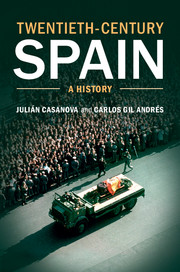Book contents
- Frontmatter
- Contents
- List of illustrations
- Key figures
- List of abbreviations
- Twentieth-century Spain timeline
- Maps
- Introduction
- Part I The monarchy of Alfonso XIII
- Part II The Second Republic
- 5 A parliamentary and constitutional republic
- 6 A republic beleaguered
- 7 1936: the destruction of democracy
- Part III The Civil War
- Part IV Franco’s dictatorship
- Part V Transition and democracy
- Guide to further reading
- Index of names and authors
- References
5 - A parliamentary and constitutional republic
Published online by Cambridge University Press: 05 July 2014
- Frontmatter
- Contents
- List of illustrations
- Key figures
- List of abbreviations
- Twentieth-century Spain timeline
- Maps
- Introduction
- Part I The monarchy of Alfonso XIII
- Part II The Second Republic
- 5 A parliamentary and constitutional republic
- 6 A republic beleaguered
- 7 1936: the destruction of democracy
- Part III The Civil War
- Part IV Franco’s dictatorship
- Part V Transition and democracy
- Guide to further reading
- Index of names and authors
- References
Summary
The municipal elections of 12 April 1931 became a plebiscite between a monarchy and a republic. The republicans won in most of the provincial capitals, and King Alfonso XIII was forced to leave Spain. He did so from Cartagena, and when he arrived in Paris he declared that the Republic was ‘a storm that will soon blow over’. However, it lasted longer than the dethroned king thought or hoped. This Republic was to experience more than five years of peace, until a military uprising and a war destroyed it by force of arms.
In the first two years of the Republic, the republican and socialist governments introduced sweeping reforms that affected the state, the Church, the army and almost every sector of society. These reforms opened a chasm between Church and State, employers and workers, defenders of traditional order and supporters of the Republic. Almost from the beginning there were serious public order problems, demonstrations, agricultural worker revolts and sabre rattling, including the first attempt at a military coup against the legitimate Republic. This mixture of great hopes, reforms, conflicts and resistance was what marked the Republic during its first two years.
- Type
- Chapter
- Information
- Twentieth-Century SpainA History, pp. 107 - 126Publisher: Cambridge University PressPrint publication year: 2014



